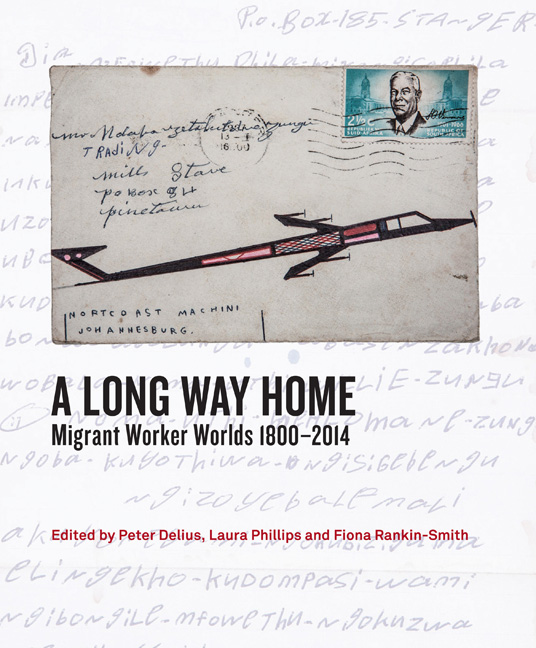Book contents
- Frontmatter
- Contents
- Acknowledgements
- Introduction: Highlighting Migrant Humanity
- Chapter 1 Ngezinyawo - Migrant Journeys
- Chapter 2 Slavery, Indenture and Migrant Labour: Maritime Immigration from Mozambique to the Cape, c.1780–1880
- Chapter 3 Walking 2 000 Kilometres to Work and Back: The Wandering Bassuto by Carl Richter
- Chapter 4 A Century of Migrancy from Mpondoland
- Chapter 5 The Migrant Kings of Zululand
- Chapter 6 The Art of Those Left Behind: Women, Beadwork and Bodies
- Chapter 7 The Illusion of Safety: Migrant Labour and Occupational Disease on South Africa's Gold Mines
- Chapter 8 ‘The Chinese Experiment’: Images from the Expansion of South Africas ‘Labour Empire’
- Chapter 9 ‘Stray Boys’: The Kruger National Park and Migrant Labour
- Chapter 10 Surviving Drought: Migrancy and the Homestead Economy
- Chapter 11 Migrants from Zebediela and Shifting Identities on the Rand, 1930s–1970s
- Chapter 12 Verwoerd's Oxen: Performing Labour Migrancy in Southern Africa
- Chapter 13 ‘Give My Regards to Everyone at Home Including Those I No Longer Remember’: The Journey of Tito Zungu's Envelopes
- Chapter 14 Sophie and the City: Womanhood, Labour and Migrancy
- Chapter 15 Bungityala
- Chapter 16 Migrants: Vanguard of the Worker's Struggles?
- Chapter 17 Debt or Savings? Of Migrants, Mines and Money
- Chapter 18 Post-Apartheid Migrancy and the Life of a Pondo Mineworker
- Notes on Contributors
- List of Figures and Tables
- Index
Chapter 4 - A Century of Migrancy from Mpondoland
Published online by Cambridge University Press: 04 July 2018
- Frontmatter
- Contents
- Acknowledgements
- Introduction: Highlighting Migrant Humanity
- Chapter 1 Ngezinyawo - Migrant Journeys
- Chapter 2 Slavery, Indenture and Migrant Labour: Maritime Immigration from Mozambique to the Cape, c.1780–1880
- Chapter 3 Walking 2 000 Kilometres to Work and Back: The Wandering Bassuto by Carl Richter
- Chapter 4 A Century of Migrancy from Mpondoland
- Chapter 5 The Migrant Kings of Zululand
- Chapter 6 The Art of Those Left Behind: Women, Beadwork and Bodies
- Chapter 7 The Illusion of Safety: Migrant Labour and Occupational Disease on South Africa's Gold Mines
- Chapter 8 ‘The Chinese Experiment’: Images from the Expansion of South Africas ‘Labour Empire’
- Chapter 9 ‘Stray Boys’: The Kruger National Park and Migrant Labour
- Chapter 10 Surviving Drought: Migrancy and the Homestead Economy
- Chapter 11 Migrants from Zebediela and Shifting Identities on the Rand, 1930s–1970s
- Chapter 12 Verwoerd's Oxen: Performing Labour Migrancy in Southern Africa
- Chapter 13 ‘Give My Regards to Everyone at Home Including Those I No Longer Remember’: The Journey of Tito Zungu's Envelopes
- Chapter 14 Sophie and the City: Womanhood, Labour and Migrancy
- Chapter 15 Bungityala
- Chapter 16 Migrants: Vanguard of the Worker's Struggles?
- Chapter 17 Debt or Savings? Of Migrants, Mines and Money
- Chapter 18 Post-Apartheid Migrancy and the Life of a Pondo Mineworker
- Notes on Contributors
- List of Figures and Tables
- Index
Summary
Migrant workers from Mpondoland have been characterised as traditionalist and fiercely attached to their rural homes. Yet mineworkers from this area came into the national news in August 2012 as both strikers and victims of the shootings at Marikana Platinum Mine. Of the 45 people killed at Marikana, 30 came from Mpondoland and nearby districts of the Eastern Cape/ former Transkei. Their deaths raise questions about their history and their politics. While it is important not to ethnicise a diverse segment of the South African workforce, or the strikes themselves, I suggest that a sense of collective identity has, in part, shaped their experiences of migration over the long term.
Labour migrancy and the rural economy
Historians have analysed different patterns of migrant labour in southern Africa, but it is still difficult to distinguish the forms of consciousness and organisation that arose amongst specific groups and networks of migrants. Migrants from Mpondoland were, in part, distinctive because the Mpondo chiefdom was, in 1894, amongst the last to be annexed in South Africa as a whole. They were not conquered by force, lost little of their land to settlers and were pushed into wage labour at a later stage than other African societies. Most families maintained access to arable plots, as well as grazing for their livestock, until far into the twentieth century. Since the region is blessed with high rainfall, smallholder agriculture was relatively effective, at least until the 1960s. Mpondoland comprised only 7 of the 26 old Transkeian districts (the number rose to 28 in the 1970s when the homeland was consolidated). Yet although they were sometimes categorised as Xhosa in the homeland era, Mpondo people retained their identity, as well as separate paramount chiefs and regional political authorities.
Until the 1960s, Mpondo migrants characteristically worked underground on the gold mines and as canecutters in the Natal sugar fields.1 In general terms, their experience differed from rural isiZulu-speakers to the north, who tended to avoid long phases of underground work and cane-cutting; they worked in mills or migrated to Durban or Johannesburg. Those to the south, in the western Transkeian and Ciskeian districts, gravitated more to the Cape ports, working on the docks and in a wide range of urban employment. Bhaca workers from Mount Frere, neighbouring Mpondoland, specialised for some decades in night-soil removal and municipal employment in Durban and on the Witwatersrand.
- Type
- Chapter
- Information
- A Long Way HomeMigrant Worker Worlds 1800–2014, pp. 59 - 73Publisher: Wits University PressPrint publication year: 2014



